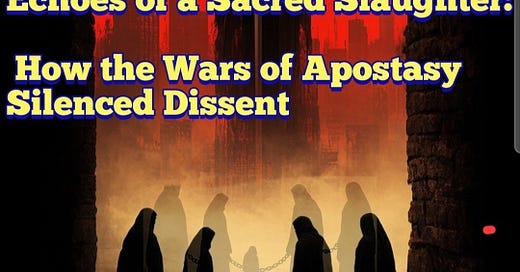Echoes of a Sacred Slaughter: How the Wars of Apostasy Silenced Dissent
In the Western world, the concept of the "Wars of Apostasy" (Ridda Wars) and their glorification in Islamic culture and history remain largely unknown. These wars, which erupted immediately after the death of the Prophet Muhammad in 632 CE, were a brutal campaign led by Abu Bakr, the first caliph and one of Muhammad’s closest companions, to suppress the Arab tribes that renounced Islam following the Prophet’s passing.
Most of these tribes, scattered across the Arabian Peninsula, refused to pay zakat (a religious tax) to the new Islamic state, effectively rejecting its authority, which was interpreted as apostasy.
Abu Bakr launched a military campaign to eradicate these "apostates," aiming not only to crush their rebellion but also to eliminate any normalization of apostasy in the nascent Islamic community. This campaign, often celebrated in Islamic historiography as a sacred act of preserving the faith, succeeded in reasserting control and enforcing religious conformity.
To many Muslims, even today, these wars are revered as a holy endeavor, a form of sanctified genocide that ensured Islam’s dominance in the region. As an ex-Muslim raised in a Muslim-majority country, I was taught about this episode in middle school, and I vividly recall my horror at the brutality of this "purification" campaign. Yet, I was silenced by fear—fear that voicing my dissent would mark me as the next target of a discourse that sanctifies the punishment of apostates.
The glorification of such events in Islamic culture renders the apostate voiceless, perpetuating a legacy of fear and suppression. If we truly understand this chapter of Islamic history, we might spare ourselves the recurrence of such atrocities, regardless of their historical veracity, because their sanctity in the collective Muslim consciousness continues to shape attitudes toward dissent and freedom of belief.
This culture of silencing has reached the UK, where ex-muslims face censorship and fear, a reality ignored despite warnings from the National Secular Society about worsening laws and definitions like "Islamophobia" that threaten their freedom to speak.




